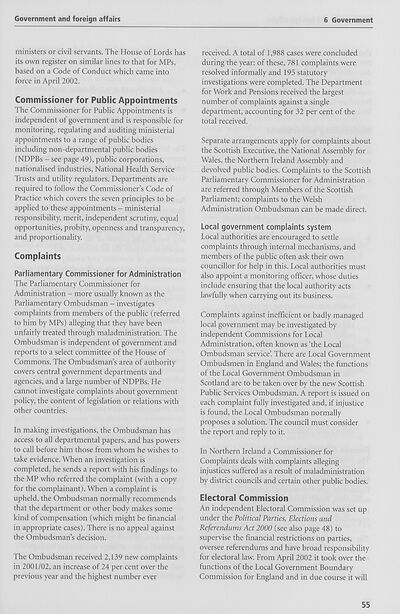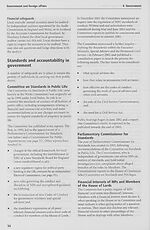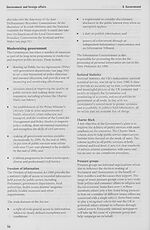Download files
Complete book:
Individual page:
Thumbnail gallery: Grid view | List view

Government and foreign affairs
6 Government
ministers or civil servants. The House of Lords has
its own register on similar lines to that for MPs,
based on a Code of Conduct which came into
force in April 2002.
Commissioner for Public Appointments
The Commissioner for Public Appointments is
independent of government and is responsible for
monitoring, regulating and auditing ministerial
appointments to a range of public bodies
including non-departmental public bodies
(NDPBs - see page 49), public corporations,
nationalised industries, National Health Service
Trusts and utility regulators. Departments are
required to follow the Commissioner’s Code of
Practice which covers the seven principles to be
applied to these appointments - ministerial
responsibility, merit, independent scrutiny, equal
opportunities, probity, openness and transparency,
and proportionality.
Complaints
Parliamentary Commissioner for Administration
The Parliamentary Commissioner for
Administration - more usually known as the
Parliamentary Ombudsman - investigates
complaints from members of the public (referred
to him by MPs) alleging that they have been
unfairly treated through maladministration. The
Ombudsman is independent of government and
reports to a select committee of the House of
Commons. The Ombudsman’s area of authority
covers central government departments and
agencies, and a large number of NDPBs. He
cannot investigate complaints about government
policy, the content of legislation or relations with
other countries.
In making investigations, the Ombudsman has
access to all departmental papers, and has powers
to call before him those from whom he wishes to
take evidence. When an investigation is
completed, he sends a report with his findings to
the MP who referred the complaint (with a copy
for the complainant). When a complaint is
upheld, the Ombudsman normally recommends
that the department or other body makes some
kind of compensation (which might be financial
in appropriate cases). There is no appeal against
the Ombudsman’s decision.
The Ombudsman received 2,139 new complaints
in 2001/02, an increase of 24 per cent over the
previous year and the highest number ever
received. A total of 1,988 cases were concluded
during the year: of these, 781 complaints were
resolved informally and 195 statutory
investigations were completed. The Department
for Work and Pensions received the largest
number of complaints against a single
department, accounting for 32 per cent of the
total received.
Separate arrangements apply for complaints about
the Scottish Executive, the National Assembly for
Wales, the Northern Ireland Assembly and
devolved public bodies. Complaints to the Scottish
Parliamentary Commissioner for Administration
are referred through Members of the Scottish
Parliament; complaints to the Welsh
Administration Ombudsman can be made direct.
Local government complaints system
Local authorities are encouraged to settle
complaints through internal mechanisms, and
members of the public often ask their own
councillor for help in this. Local authorities must
also appoint a monitoring officer, whose duties
include ensuring that the local authority acts
lawfully when carrying out its business.
Complaints against inefficient or badly managed
local government may be investigated by
independent Commissions for Local
Administration, often known as ‘the Local
Ombudsman service’. There are Local Government
Ombudsmen in England and Wales; the functions
of the Local Government Ombudsman in
Scotland are to be taken over by the new Scottish
Public Services Ombudsman. A report is issued on
each complaint fully investigated and, if injustice
is found, the Local Ombudsman normally
proposes a solution. The council must consider
the report and reply to it.
In Northern Ireland a Commissioner for
Complaints deals with complaints alleging
injustices suffered as a result of maladministration
by district councils and certain other public bodies.
Electoral Commission
An independent Electoral Commission was set up
under the Political Parties, Elections and
Referendnms Act 2000 (see also page 48) to
supervise the financial restrictions on parties,
oversee referendums and have broad responsibility
for electoral law. From April 2002 it took over the
functions of the Local Government Boundary
Commission for England and in due course it will
55
6 Government
ministers or civil servants. The House of Lords has
its own register on similar lines to that for MPs,
based on a Code of Conduct which came into
force in April 2002.
Commissioner for Public Appointments
The Commissioner for Public Appointments is
independent of government and is responsible for
monitoring, regulating and auditing ministerial
appointments to a range of public bodies
including non-departmental public bodies
(NDPBs - see page 49), public corporations,
nationalised industries, National Health Service
Trusts and utility regulators. Departments are
required to follow the Commissioner’s Code of
Practice which covers the seven principles to be
applied to these appointments - ministerial
responsibility, merit, independent scrutiny, equal
opportunities, probity, openness and transparency,
and proportionality.
Complaints
Parliamentary Commissioner for Administration
The Parliamentary Commissioner for
Administration - more usually known as the
Parliamentary Ombudsman - investigates
complaints from members of the public (referred
to him by MPs) alleging that they have been
unfairly treated through maladministration. The
Ombudsman is independent of government and
reports to a select committee of the House of
Commons. The Ombudsman’s area of authority
covers central government departments and
agencies, and a large number of NDPBs. He
cannot investigate complaints about government
policy, the content of legislation or relations with
other countries.
In making investigations, the Ombudsman has
access to all departmental papers, and has powers
to call before him those from whom he wishes to
take evidence. When an investigation is
completed, he sends a report with his findings to
the MP who referred the complaint (with a copy
for the complainant). When a complaint is
upheld, the Ombudsman normally recommends
that the department or other body makes some
kind of compensation (which might be financial
in appropriate cases). There is no appeal against
the Ombudsman’s decision.
The Ombudsman received 2,139 new complaints
in 2001/02, an increase of 24 per cent over the
previous year and the highest number ever
received. A total of 1,988 cases were concluded
during the year: of these, 781 complaints were
resolved informally and 195 statutory
investigations were completed. The Department
for Work and Pensions received the largest
number of complaints against a single
department, accounting for 32 per cent of the
total received.
Separate arrangements apply for complaints about
the Scottish Executive, the National Assembly for
Wales, the Northern Ireland Assembly and
devolved public bodies. Complaints to the Scottish
Parliamentary Commissioner for Administration
are referred through Members of the Scottish
Parliament; complaints to the Welsh
Administration Ombudsman can be made direct.
Local government complaints system
Local authorities are encouraged to settle
complaints through internal mechanisms, and
members of the public often ask their own
councillor for help in this. Local authorities must
also appoint a monitoring officer, whose duties
include ensuring that the local authority acts
lawfully when carrying out its business.
Complaints against inefficient or badly managed
local government may be investigated by
independent Commissions for Local
Administration, often known as ‘the Local
Ombudsman service’. There are Local Government
Ombudsmen in England and Wales; the functions
of the Local Government Ombudsman in
Scotland are to be taken over by the new Scottish
Public Services Ombudsman. A report is issued on
each complaint fully investigated and, if injustice
is found, the Local Ombudsman normally
proposes a solution. The council must consider
the report and reply to it.
In Northern Ireland a Commissioner for
Complaints deals with complaints alleging
injustices suffered as a result of maladministration
by district councils and certain other public bodies.
Electoral Commission
An independent Electoral Commission was set up
under the Political Parties, Elections and
Referendnms Act 2000 (see also page 48) to
supervise the financial restrictions on parties,
oversee referendums and have broad responsibility
for electoral law. From April 2002 it took over the
functions of the Local Government Boundary
Commission for England and in due course it will
55
Set display mode to:
![]() Universal Viewer |
Universal Viewer | ![]() Mirador |
Large image | Transcription
Mirador |
Large image | Transcription
The item on this page appears courtesy of Office for National Statistics and may be re-used under the Open Government Licence for Public Sector Information.
| Britain and UK handbooks > UK: The official yearbook of the United Kingdom of Great Britain and Northern Ireland > 2003 > (77) |
|---|
| Permanent URL | https://digital.nls.uk/204924108 |
|---|
| Attribution and copyright: |
|
|---|---|
| Description | Three volumes of 'UK: The official yearbook of the United Kingdom of Great Britain and Northern Ireland', published annually by the Office of National Statistics from 2002-2005. |
|---|---|
| Shelfmark | GII.11 SER |
| Description | Three titles produced by the British Government from 1954-2005 describing 'how Britain worked'. They are: 'Britain: An official handbook' (1954-1998), 'Britain: The official yearbook of the United Kingdom' (1999-2001), and 'UK: The official yearbook of the United Kingdom of Great Britain and Northern Ireland' (2002-2005). These 50 reports provide an overview of Britain's economic, social and cultural affairs, its environment, international relations, and the systems of government. They give an impartial summary of government policies and initiatives, and explain how public services are organised. |
|---|---|
| Additional NLS resources: |
|

